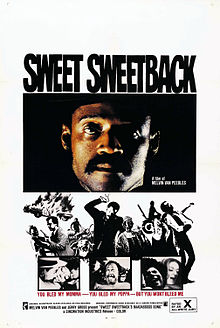
Back Blaxploitation ALS سينما استغلال السود Arabic Blaxploitation Catalan Blaxploitation Danish Blaxploitation German Blaxploitation Spanish Blaxploitation Basque سینمای تجارتی سیاهان Persian Blaxploitaatio Finnish Blaxploitation French
 Poster of the Blaxploitation film Sweet Sweetback's Baadasssss Song (1971) | |
| Years active | 1970s |
|---|---|
| Location | United States |
| Major figures | |
| Influences | |
| Influenced | |
Blaxploitation is an ethnic subgenre of the exploitation film that emerged in the United States during the early 1970s, when the combined momentum of the civil rights movement, the Black power movement, and the Black Panthers spurred black artists to reclaim power over their image, and institutions like UCLA to provide financial assistance for students of color to study filmmaking. This combined with Hollywood adopting a less restrictive rating system in 1968.[1] The term, a portmanteau of the words "black" and "exploitation", was coined in August 1972 by Junius Griffin, the president of the Beverly Hills–Hollywood NAACP branch. He claimed the genre was "proliferating offenses" to the black community in its perpetuation of stereotypes often involved in crime.[2] After the race films of the 1940s and 1960s, the genre emerged as one of the first in which black characters and communities were protagonists, rather than sidekicks, supportive characters, or victims of brutality.[3][clarify] The genre's inception coincides with the rethinking of race relations in the 1970s.
Blaxploitation films were originally aimed at an urban African-American audience but the genre's audience appeal soon broadened across racial and ethnic lines.[4] Hollywood realized the potential profit of expanding the audiences of blaxploitation films.
Variety credited Sweet Sweetback's Baadasssss Song and the less radical Hollywood-financed film Shaft (both released in 1971) with the invention of the blaxploitation genre, although Cotton Comes to Harlem was released the prior year.[5] Blaxploitation films were also the first to feature soundtracks of funk and soul music.[6]
- ^ "Say It Loud! The Black Cinema Revolution". Harvard Film Archive. October 21, 2016. Retrieved January 31, 2024.
- ^ Anderson, Tre’vell (June 8, 2018). "A look back at the blaxploitation era through 2018 eyes". Los Angeles Times. Archived from the original on June 8, 2018. Retrieved May 22, 2022.
- ^ Lyne, Bill (April 1, 2000). "No Accident: From Black Power to Black Box Office". African American Review. 34 (1): 39–59. doi:10.2307/2901183. JSTOR 2901183.
- ^ Denby, David (August 1972). "Getting Whitey". The Atlantic Monthly: 86–88.
- ^ James, Darius (1995). That's Blaxploitation!: Roots of the Baadasssss 'Tude (Rated X by an All-Whyte Jury). St. Martin's Press. ISBN 0-312-13192-5.
- ^ Ebert, Roger (June 11, 2004). "Review of Baadasssss!". Chicago Sun-Times. Archived from the original on February 17, 2007. Retrieved January 4, 2007.
© MMXXIII Rich X Search. We shall prevail. All rights reserved. Rich X Search